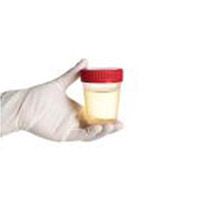Article
Bladder Cancer Screening Only Requires Urine Sample
Author(s):
A urine sample may be all that is required for a new bladder cancer screening diagnostic test, according to new research.

Urine metabolites may provide the link to noninvasive bladder cancer (BCa) diagnostic screenings and recurrent disease management, according to research published in PLOS One.
Researchers from Metabolon, Inc., in Durham, North Carolina and the University of Texas Southwestern Medical Center conducted a study of 332 urine samples, of which 66 were BCa positive, in order to test their novel biomarker test for BCa. The researchers chose to investigate mass spectrometer method because of the high cost and invasive nature of cystoscopy in combination with frequent follow up screenings. After obtaining the samples, researchers identified 25 urine biomarkers based on metabolic comparison in library entries. The biomarkers were then compared between the healthy and BCa positive urine samples.
Cohort 1 was used to identify which biomarkers were different from cohort 2, made up of 29 urine samples from BCa positive patients and 79 controls. The researchers found biochemical levels differed between the 2 groups, as expected. Cohort 1 was divided into 3 populations: 1) subjects presenting with hematuria; 2) subjects with a history of BCa, but no current disease and 3) normal subjects with no history of BCa. Both cohorts displayed some racial and gender differences among the samples, but the researchers noted they were not statistically significant.
The researchers further broke down the “best biomarker candidates” to identify biomarkers that were viable detection candidates into manageable quantities. After applying these criteria, the researchers found 25 biomarkers eligible to show differences between BCa samples and healthy samples.
“Measurement of urine metabolites may provide a companion diagnostic method which could facilitate the monitoring of bladder cancer recurrence and perhaps also contribute to primary diagnosis,” the authors concluded. “A subset of metabolites displayed statistically significant differences in cancer versus non cancer urines in both of 2 independent sample cohorts. Some urine metabolite differences may reflect a reprogramming of glycolysis and lipid metabolism in tumor tissue.”
The researchers also added that further investigations into this method are required before it can be validated as a BCa screening method. However, the results of this experiment indicate potential in utilizing urine metabolites as a noninvasive BCa diagnostic test and monitoring tool.





